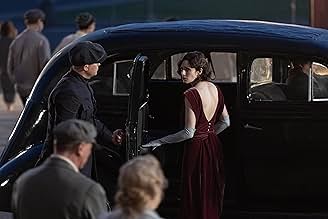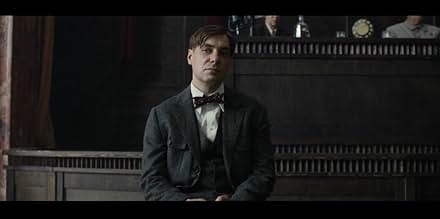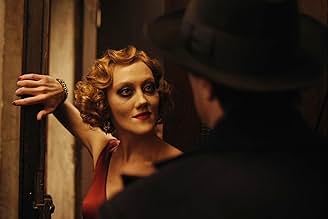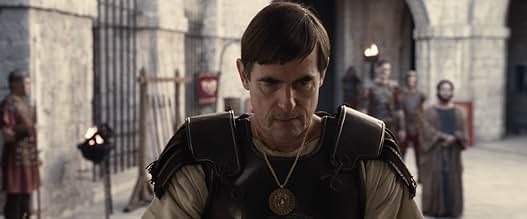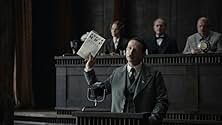AVALIAÇÃO DA IMDb
7,2/10
4,9 mil
SUA AVALIAÇÃO
O romance de um escritor é banido e a peça é cancelada. Ele então concebe um romance satírico em que um personagem semelhante a um demônio metaforicamente se vinga dos responsáveis.O romance de um escritor é banido e a peça é cancelada. Ele então concebe um romance satírico em que um personagem semelhante a um demônio metaforicamente se vinga dos responsáveis.O romance de um escritor é banido e a peça é cancelada. Ele então concebe um romance satírico em que um personagem semelhante a um demônio metaforicamente se vinga dos responsáveis.
- Direção
- Roteiristas
- Artistas
- Prêmios
- 14 vitórias e 9 indicações no total
Aleksei Guskov
- Maygel
- (as Aleksey Guskov)
- Direção
- Roteiristas
- Elenco e equipe completos
- Produção, bilheteria e muito mais no IMDbPro
Avaliações em destaque
This film is a cinematic adaptation of famous and brilliant Russian book that was written in 1928-1940 amongst darkest years of Big Terror and banned for many years. Mikhail Bulgakov well knew that his novel won't be ever published but kept writing.and rewriting it as something very personal. The book was never finished but his wife brought his drafts together after he died and they gradually found it's way into emerging Samizdat with people printing copies on typewritters and sharing them. My literature teacher used to tell us story how she read this book overnight since she had to pass copy to the next reader (btw she didn't like it :) but admitted it was a great work nevertheless). Eventually knowing that book became a sign of a well educated and free minded person in USSR and part of a cult following with
But let's get back to the movie. Bulgakov's book was adapted into several films and film series but proved to be exceptionally difficult to maintain book spirit, pretty much like we don't have good adaptations for excellent books of Terry Pratchett. However this film is the very best adaptation that I saw. Unlike some other adaptations it does not try to literally follow the book, but it wonderfully captures it's very essence.
The plot revolves around a writer in Soviet Union who finds himself at odds with new government and left without means to survive amongst rapidly unfolding political terror. Nevertheless he meets a married woman who inspires him to start writing a new book while knowing that it won't be published and might actually.get him jailed. A tragic love story unfolds and helps both to keep going and fighting in a seemingly hopeless environment. The writer starts to add persons from his own life as characters in his book and mystically the story that he wrote starts to influence the actual world where he lives. As an author he can write a happy ending for lovers in his story, but will it become real as well? And are all those mystic events happening around even real at all or just merely his own imagination?
As you might have guessed by now this story is mirroring personal story of Bulgakov life and I was very impressed how well film captured this intertwining between Bulgakov and the book he wrote. It also brilliantly reproduced his harsh satire on Soviet society where words and actions were totally different and it feels very actual for modern day Russia that rapidly follows same steps. It faithfully reproduces most of the key story moments from original book. And God, it's absolutely beautiful visually. Cast is truly excellent too with plenty of memorable characters and while nominally it is pretty long it certainly doesn't feel.so when you watch it.
There are several reasons to dislike this film. The book was significantly shortened - it simply too large to fit everything. Original book had strong and memorable Biblical elements but they were almost removed. Satiric elements are exaggerated visually while original book had them wonderfully written on top of normal, easily recognizable everyday life. I think it was the right decision because an exaggerated fantastic Soviet city is a good showcase of Soviet propaganda of 193x that was all too well known to Bulgakov and his early readers but is largely forgotten now, however I understand why some might disagree with such modification. Finally film tends to often paint it's story with a broad strokes and subtle hints relying on watcher to fill in details and omitted parts. This works wonderfully for people familiar with horrible Russian history of 1930s as well as original book, but it could be confusing for people who never read the book and unfamiliar with that part of Russian history.
Despite all these issues, I think it's a real masterpiece. Book adaptations are always difficult and this is a rare example of very successful adaptation of a complex and allegorical book. Must see for those who.read and loved Master and Margarita or want to better understand Russians and their history. Aside from that it's a good and visually beautiful film.
But let's get back to the movie. Bulgakov's book was adapted into several films and film series but proved to be exceptionally difficult to maintain book spirit, pretty much like we don't have good adaptations for excellent books of Terry Pratchett. However this film is the very best adaptation that I saw. Unlike some other adaptations it does not try to literally follow the book, but it wonderfully captures it's very essence.
The plot revolves around a writer in Soviet Union who finds himself at odds with new government and left without means to survive amongst rapidly unfolding political terror. Nevertheless he meets a married woman who inspires him to start writing a new book while knowing that it won't be published and might actually.get him jailed. A tragic love story unfolds and helps both to keep going and fighting in a seemingly hopeless environment. The writer starts to add persons from his own life as characters in his book and mystically the story that he wrote starts to influence the actual world where he lives. As an author he can write a happy ending for lovers in his story, but will it become real as well? And are all those mystic events happening around even real at all or just merely his own imagination?
As you might have guessed by now this story is mirroring personal story of Bulgakov life and I was very impressed how well film captured this intertwining between Bulgakov and the book he wrote. It also brilliantly reproduced his harsh satire on Soviet society where words and actions were totally different and it feels very actual for modern day Russia that rapidly follows same steps. It faithfully reproduces most of the key story moments from original book. And God, it's absolutely beautiful visually. Cast is truly excellent too with plenty of memorable characters and while nominally it is pretty long it certainly doesn't feel.so when you watch it.
There are several reasons to dislike this film. The book was significantly shortened - it simply too large to fit everything. Original book had strong and memorable Biblical elements but they were almost removed. Satiric elements are exaggerated visually while original book had them wonderfully written on top of normal, easily recognizable everyday life. I think it was the right decision because an exaggerated fantastic Soviet city is a good showcase of Soviet propaganda of 193x that was all too well known to Bulgakov and his early readers but is largely forgotten now, however I understand why some might disagree with such modification. Finally film tends to often paint it's story with a broad strokes and subtle hints relying on watcher to fill in details and omitted parts. This works wonderfully for people familiar with horrible Russian history of 1930s as well as original book, but it could be confusing for people who never read the book and unfamiliar with that part of Russian history.
Despite all these issues, I think it's a real masterpiece. Book adaptations are always difficult and this is a rare example of very successful adaptation of a complex and allegorical book. Must see for those who.read and loved Master and Margarita or want to better understand Russians and their history. Aside from that it's a good and visually beautiful film.
The movie adaptation of the classic book is a rare gem that successfully captures the essence of the story, the tragic lives of the Master and Margarita. The film explores the absurdity of communism, the struggles a creative writer has to endure under a suppressive regime, and features a beautiful love story that adds to the movie's emotional depth. The execution of the film is excellent, with fantastic actors bringing the characters to life, including August Diehl as Woland, Yevgeny Tsyganov as the Master, and Yuliya Snigir as Margarita. In all, I loved the different themes interwoven in this lovely tragedy.
The latest cinematic rendition of Mikhail Bulgakov's "Master and Margarita" is a compelling and artistically rich adaptation that both honors and reinterprets the classic novel. Differing from the beloved 2005 series starring Oleg Basilashvili, this new version presents a fresh perspective on the timeless story, offering a unique visual and narrative experience.
At its core, the film remains faithful to Bulgakov's narrative, weaving the parallel tales of the Master, a writer persecuted for his work, Margarita, his devoted lover, and the fantastical events surrounding the devil's visit to Moscow. However, the director's approach infuses the story with a distinct contemporary flair, setting it apart from previous adaptations.
Visually, the film is a feast for the eyes, combining stunning cinematography with imaginative special effects that bring the mystical elements of the story to life. The portrayal of Woland's entourage is particularly noteworthy, capturing their eerie and whimsical nature.
The performances are exceptional, with each actor bringing depth and nuance to their characters. The chemistry between the Master and Margarita is palpable, adding an emotional weight to their tragic romance.
The film's pacing and tone do justice to Bulgakov's complex narrative, balancing the dark, satirical elements with moments of profound emotion. The modern touch to the story's presentation may divide traditionalists but is sure to captivate a new generation of viewers.
In conclusion, this new adaptation of "Master and Margarita" is a daring and visually stunning film that breathes new life into Bulgakov's masterpiece. It is a must-watch for fans of the novel and for those seeking a thought-provoking and beautifully crafted cinematic experience.
At its core, the film remains faithful to Bulgakov's narrative, weaving the parallel tales of the Master, a writer persecuted for his work, Margarita, his devoted lover, and the fantastical events surrounding the devil's visit to Moscow. However, the director's approach infuses the story with a distinct contemporary flair, setting it apart from previous adaptations.
Visually, the film is a feast for the eyes, combining stunning cinematography with imaginative special effects that bring the mystical elements of the story to life. The portrayal of Woland's entourage is particularly noteworthy, capturing their eerie and whimsical nature.
The performances are exceptional, with each actor bringing depth and nuance to their characters. The chemistry between the Master and Margarita is palpable, adding an emotional weight to their tragic romance.
The film's pacing and tone do justice to Bulgakov's complex narrative, balancing the dark, satirical elements with moments of profound emotion. The modern touch to the story's presentation may divide traditionalists but is sure to captivate a new generation of viewers.
In conclusion, this new adaptation of "Master and Margarita" is a daring and visually stunning film that breathes new life into Bulgakov's masterpiece. It is a must-watch for fans of the novel and for those seeking a thought-provoking and beautifully crafted cinematic experience.
These days it's tempting to refuse anything Russian, but in this case one has to note that 1) this is adapted from the most celebrated work of Russian fiction in the 20th century, written by a Kiev-born dramatist shortly before his death and forbidden from publication in the Soviet Union until the 1960s, and 2) this was largely financed by an Odessa-born American billionaire who owns the sports network DAZN. Also, principal photography was finished in late 2021, before the invasion of Ukraine.
The phantasmagorical plot makes for an extraordinary reading experience because one cannot summarize it. Like all truly great literature, this is not really a story about something, it's a series of bizarre anecdotes set in the framework of forsaken romance in the claustrophobic Stalinist Moscow of the 1930s, where the Devil appears on the pages of a writer in crisis, and then seemingly in reality. German actor August Diehl's performance as Woland is the best of his career and he gives the character a perfect ambivalence which is required in portraying the supernatural. It is quite possible to read into his Satan an allegory of Putin himself, and it is also quite possible to deny it. The hysterical satire of the novel requires high production values which previous adaptations never achieved - this film almost overdoes it, as do many Russian actors. But the leading couple is quite convincing, even if they pale within the impressive imagery.
Upon release in Russia, the film was attacked by the Pro-Putin crowd which helped to turn this into the most successful Russian film of the century. It's a miracle it was even released since US-born director Lockshin finished post-production in the States and did not return to Russia after the invasion, which he has frequently condemned. So credit where credit is due, this film is a beacon of creative light in Russia's political darkness.
The phantasmagorical plot makes for an extraordinary reading experience because one cannot summarize it. Like all truly great literature, this is not really a story about something, it's a series of bizarre anecdotes set in the framework of forsaken romance in the claustrophobic Stalinist Moscow of the 1930s, where the Devil appears on the pages of a writer in crisis, and then seemingly in reality. German actor August Diehl's performance as Woland is the best of his career and he gives the character a perfect ambivalence which is required in portraying the supernatural. It is quite possible to read into his Satan an allegory of Putin himself, and it is also quite possible to deny it. The hysterical satire of the novel requires high production values which previous adaptations never achieved - this film almost overdoes it, as do many Russian actors. But the leading couple is quite convincing, even if they pale within the impressive imagery.
Upon release in Russia, the film was attacked by the Pro-Putin crowd which helped to turn this into the most successful Russian film of the century. It's a miracle it was even released since US-born director Lockshin finished post-production in the States and did not return to Russia after the invasion, which he has frequently condemned. So credit where credit is due, this film is a beacon of creative light in Russia's political darkness.
Great movie!
At times, quotes from the novel are spoken word for word, at times the director changes details, but clearly just to fit everything in - the runtime is already huge.
Voland and the Master are miscast, especially the Master. They confused a melancholic alcoholic with a gothic metrosexual. The cat remains undeveloped. How the actor who played Ivanushka ended up in this movie is a mystery.
But Gella, Margarita, Koroviev, Pilate, and Maigret are good choices.
Stravinsky is very good!
Stepa Likhodeev is brilliantly played, the best role (it's a pity it's not bigger).
All the most important quotes from the book are spoken, but there wasn't enough time for the funniest ones.
The director, praise Satan, didn't fill the movie with funny scenes, although there are plenty in the book, and instead focused on exactly what Bulgakov's novel is about: censorship under a dictator, which drives not only writers but also ordinary citizens insane.
At times, quotes from the novel are spoken word for word, at times the director changes details, but clearly just to fit everything in - the runtime is already huge.
Voland and the Master are miscast, especially the Master. They confused a melancholic alcoholic with a gothic metrosexual. The cat remains undeveloped. How the actor who played Ivanushka ended up in this movie is a mystery.
But Gella, Margarita, Koroviev, Pilate, and Maigret are good choices.
Stravinsky is very good!
Stepa Likhodeev is brilliantly played, the best role (it's a pity it's not bigger).
All the most important quotes from the book are spoken, but there wasn't enough time for the funniest ones.
The director, praise Satan, didn't fill the movie with funny scenes, although there are plenty in the book, and instead focused on exactly what Bulgakov's novel is about: censorship under a dictator, which drives not only writers but also ordinary citizens insane.
Você sabia?
- ConexõesReferenced in Close-Up: The Master and Margarita (2024)
Principais escolhas
Faça login para avaliar e ver a lista de recomendações personalizadas
- How long is The Master and Margarita?Fornecido pela Alexa
Detalhes
- Data de lançamento
- País de origem
- Central de atendimento oficial
- Idiomas
- Também conhecido como
- Master & Margarita
- Locações de filme
- Empresas de produção
- Consulte mais créditos da empresa na IMDbPro
Bilheteria
- Orçamento
- RUR 1.233.000.000 (estimativa)
- Faturamento bruto mundial
- US$ 28.727.824
- Tempo de duração2 horas 36 minutos
- Cor
- Proporção
- 2.39:1
Contribua para esta página
Sugerir uma alteração ou adicionar conteúdo ausente

Principal brecha
What is the Canadian French language plot outline for O Mestre e Margarida (2024)?
Responda
![Assistir a Trailer [OV]](https://m.media-amazon.com/images/M/MV5BZTk1ODEzN2MtYzRiZS00NTBlLWIxYmMtM2E4MzYxYTU4YWU0XkEyXkFqcGdeQXRyYW5zY29kZS13b3JrZmxvdw@@._V1_QL75_UX500_CR0)
